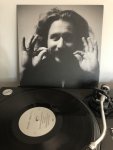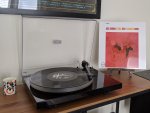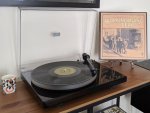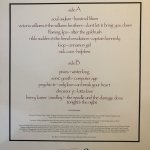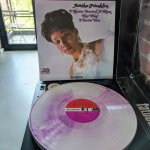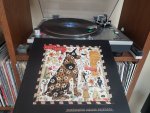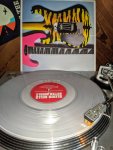You are using an out of date browser. It may not display this or other websites correctly.
You should upgrade or use an alternative browser.
You should upgrade or use an alternative browser.
July 2020 Record Challenge (The Raffle Strikes Back)
- Thread starter gaporter
- Start date
Selaws
Well-Known Member
Day 26 - IT'S NOT ABOUT WHO DID IT FIRST, BUT WHO DID IT BETTER
Lee Morgan - Delightfulee (Blue Note, 1967 First Stereo Pressing)
This is a somewhat obscure release in the Lee Morgan discography. The majority of songs are original compositions with 2 oddities thrown in, a cover of 'Sunrise, Sunset' from Fiddler On The Roof, and 'Yesterday' by the Beatles. Its really quite unusual and unexpected, but in a good way. 'Yesterday' was a highlight!
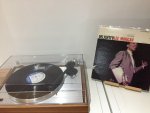
Lee Morgan - Delightfulee (Blue Note, 1967 First Stereo Pressing)
This is a somewhat obscure release in the Lee Morgan discography. The majority of songs are original compositions with 2 oddities thrown in, a cover of 'Sunrise, Sunset' from Fiddler On The Roof, and 'Yesterday' by the Beatles. Its really quite unusual and unexpected, but in a good way. 'Yesterday' was a highlight!

BjorgenFjorgen
Well-Known Member
Piratenovelist
Well-Known Member
Rip_City
Well-Known Member
July 25: Brevity is the Soul of Wit
(catch up)
Ana Roxanne - ~~~

A beautiful ambient mini-album spanning 27 minutes. Very soothing and ethereal. She toured with Julia Holter and Weyes Blood on separate tours last year (I caught neither of the tours where she was the opener). I would love to hear more...reminds me of Julianna Barwick and Grouper.
(catch up)
Ana Roxanne - ~~~

A beautiful ambient mini-album spanning 27 minutes. Very soothing and ethereal. She toured with Julia Holter and Weyes Blood on separate tours last year (I caught neither of the tours where she was the opener). I would love to hear more...reminds me of Julianna Barwick and Grouper.
BjorgenFjorgen
Well-Known Member
sahomerrocks
Well-Known Member
Caught Up Catch Up!
JULY 23
UNCHARTED TERRITORY
Play an album where the artist was experimenting/trying something new or different
Sister Rosetta Tharpe - Gospel Train
Her previous work was mostly gospel with some guitar shredding thrown on top. This album with its harmonics and more varied instrumentation is what I think of when pointing to Sister Rosetta as the precursor to modern rock n' roll.
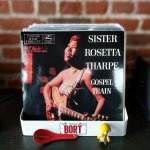
JULY 24
DON'T FORGET THE EAR PLUGS
Play something LOUD
Fucked Up - David Comes To Life
Just two absolutely unrelenting hours shredding my voice singing along with this one, but only when the wife isn't home.

JULY 25
BREVITY IS THE SOUL OF WIT
Play a short album (at least under 30 minutes)
White Lung - Paradise
I love me a short album. Music doesn't expire after X amounts of listens.

JULY 23
UNCHARTED TERRITORY
Play an album where the artist was experimenting/trying something new or different
Sister Rosetta Tharpe - Gospel Train
Her previous work was mostly gospel with some guitar shredding thrown on top. This album with its harmonics and more varied instrumentation is what I think of when pointing to Sister Rosetta as the precursor to modern rock n' roll.

JULY 24
DON'T FORGET THE EAR PLUGS
Play something LOUD
Fucked Up - David Comes To Life
Just two absolutely unrelenting hours shredding my voice singing along with this one, but only when the wife isn't home.

JULY 25
BREVITY IS THE SOUL OF WIT
Play a short album (at least under 30 minutes)
White Lung - Paradise
I love me a short album. Music doesn't expire after X amounts of listens.

TenderLovingKiller®
Well-Known Member
Rip_City
Well-Known Member
July 26: It's Not About who did it First, but who did it Better
Lianne La Havas - Lianne La Havas
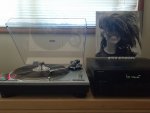
I have never listened to Lianne's music prior to this album, despite having heard her name since 2018. Shining, charismatic, soulful voice. To be honest, sometimes the instrumental backings take away from her wonderful voice (though oftentimes they contribute to the soothing vibe and provide lavish texture). But on her cover of Radiohead's "Weird Fishes/Arpeggi" simply titled as "Weird FIshes," she brings that soulful energy in the form of her voice, albeit without quite the intensity of the original instrumentation. She keeps it faithful without it being a lazy cover. The payoff in the final leg of the track ("Yeah, I'll hit the bottom..."), however, does build that intensity of the original but with even more captivating vocal performance from Lianne. She's toured playing this cover in years past, but at long last studio recorded it as an album track this year.
I know there are several Radiohead fans on N&G including our host @gaporter...if you haven't heard her cover yet, I'd love to hear what you think!
Lianne La Havas - Lianne La Havas

I have never listened to Lianne's music prior to this album, despite having heard her name since 2018. Shining, charismatic, soulful voice. To be honest, sometimes the instrumental backings take away from her wonderful voice (though oftentimes they contribute to the soothing vibe and provide lavish texture). But on her cover of Radiohead's "Weird Fishes/Arpeggi" simply titled as "Weird FIshes," she brings that soulful energy in the form of her voice, albeit without quite the intensity of the original instrumentation. She keeps it faithful without it being a lazy cover. The payoff in the final leg of the track ("Yeah, I'll hit the bottom..."), however, does build that intensity of the original but with even more captivating vocal performance from Lianne. She's toured playing this cover in years past, but at long last studio recorded it as an album track this year.
I know there are several Radiohead fans on N&G including our host @gaporter...if you haven't heard her cover yet, I'd love to hear what you think!
sahomerrocks
Well-Known Member
BjorgenFjorgen
Well-Known Member
MadLucas
Well-Known Member
DAY 26 - COVERS
In real life, and probably on this forum, it would not come as a surprise to anyone that one of my favorite albums is Waylon Jennings' Honky Tonk Heroes.
What DOES and probably WILL come as a surprise is that I discovered that Waylon album through an unexpected way: I am a massive, massive fan of Conway Twitty.
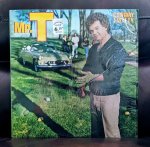
When I was growing up in the 80's, there was a TV commercial advertising a Time Life Collection of Twitty's hits. Even though I was into Beach Boys, Technotronic, Milli Vanilli, Midnight Oil, The B-52's (I had weird eclectic taste as an 8-year-old, apparently)... I had not heard what apparently was country music. But I dug the songs in the commercial.
That Saturday, I went to Caldor's (a long gone department store chain) and bought a cassette called Classic Conway for $4. I loved it, but one song that grew on me as I got older was "We Had It All."
About 5 years ago, I learned that "We Had It All" was recorded for the first time (that I am aware of) on Waylon's Honky Tonk Heroes. I found an 80's reissue for $5 at a record store near me about a month later and pulled the trigger on it.
There is no comparing the two versions. They are similar tempos, similar form arrangements, and both have key changes, but the deliveries are very, very different.
Waylon's version is the final song on an album about living hard, drinking hard, fighting hard. [Coincidentally, it's also the ONLY song not written by Billy Joe Shaver on the album.] It's easy listening to Waylon's version to imagine the person singing the song. They are sitting at a bar or the corner of a bar, possibly looking at a photograph. Their longing and sensitivity is heightened by the consumption, but ultimately is held back because they don't want to let it all out... it wouldn't be appropriate for who others think they are, so they keep drinking to make the memory go away. The best word to describe the performance: wistful.
Conway's version is much different. Whereas Waylon's recording is sparse, Twitty's is as full-on dramatic as a country song could be. The delivery doesn't seem internal, but thrust outward toward someone else. It's as if the person he is singing to is right in front of him after a long absence, and he is trying desperately but futilely to not let them go again. You can almost hear his voice on the point of breaking.
So who did it better?
Depends who hears it and when they hear it.
In real life, and probably on this forum, it would not come as a surprise to anyone that one of my favorite albums is Waylon Jennings' Honky Tonk Heroes.
What DOES and probably WILL come as a surprise is that I discovered that Waylon album through an unexpected way: I am a massive, massive fan of Conway Twitty.

When I was growing up in the 80's, there was a TV commercial advertising a Time Life Collection of Twitty's hits. Even though I was into Beach Boys, Technotronic, Milli Vanilli, Midnight Oil, The B-52's (I had weird eclectic taste as an 8-year-old, apparently)... I had not heard what apparently was country music. But I dug the songs in the commercial.
That Saturday, I went to Caldor's (a long gone department store chain) and bought a cassette called Classic Conway for $4. I loved it, but one song that grew on me as I got older was "We Had It All."
About 5 years ago, I learned that "We Had It All" was recorded for the first time (that I am aware of) on Waylon's Honky Tonk Heroes. I found an 80's reissue for $5 at a record store near me about a month later and pulled the trigger on it.
There is no comparing the two versions. They are similar tempos, similar form arrangements, and both have key changes, but the deliveries are very, very different.
Waylon's version is the final song on an album about living hard, drinking hard, fighting hard. [Coincidentally, it's also the ONLY song not written by Billy Joe Shaver on the album.] It's easy listening to Waylon's version to imagine the person singing the song. They are sitting at a bar or the corner of a bar, possibly looking at a photograph. Their longing and sensitivity is heightened by the consumption, but ultimately is held back because they don't want to let it all out... it wouldn't be appropriate for who others think they are, so they keep drinking to make the memory go away. The best word to describe the performance: wistful.
Conway's version is much different. Whereas Waylon's recording is sparse, Twitty's is as full-on dramatic as a country song could be. The delivery doesn't seem internal, but thrust outward toward someone else. It's as if the person he is singing to is right in front of him after a long absence, and he is trying desperately but futilely to not let them go again. You can almost hear his voice on the point of breaking.
So who did it better?
Depends who hears it and when they hear it.
JULY 26
IT'S NOT ABOUT WHO DID IT FIRST, BUT WHO DID IT BETTER
Play an album with a great cover song/songs on it
No brainer...
Kendra Morris – Mockingbird
View attachment 58481
no lie, i was gonna throw hands with this forum if someone didn’t play this.
BjorgenFjorgen
Well-Known Member
Day 26: Covers
Iron and Wine & Ben Bridwell - Sing Into My Mouth
This covers is album is good, not great, but it is great summer backyard music. Some excellent song choices -- not sure any surpass the originals -- but I do love David Gilmour's "No Way Out of Here" and especially J.J. Cale's "Magnolia" and Peter La Farge's/Pete Seeger's "Coyote, My Little Brother."
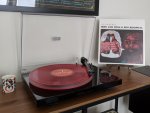
Iron and Wine & Ben Bridwell - Sing Into My Mouth
This covers is album is good, not great, but it is great summer backyard music. Some excellent song choices -- not sure any surpass the originals -- but I do love David Gilmour's "No Way Out of Here" and especially J.J. Cale's "Magnolia" and Peter La Farge's/Pete Seeger's "Coyote, My Little Brother."

Day 26: Covers
Iron and Wine & Ben Bridwell - Sing Into My Mouth
This covers is album is good, not great, but it is great summer backyard music. Some excellent song choices -- not sure any surpass the originals -- but I do love David Gilmour's "No Way Out of Here" and especially J.J. Cale's "Magnolia" and Peter La Farge's/Pete Seeger's "Coyote, My Little Brother."
View attachment 58527
technically, there’s no way out of here is a unicorn cover. gilmour produced their record ‘too many crooks’, which has that song on it.

